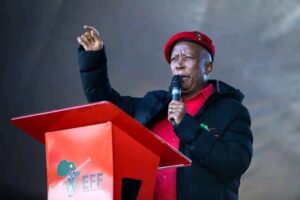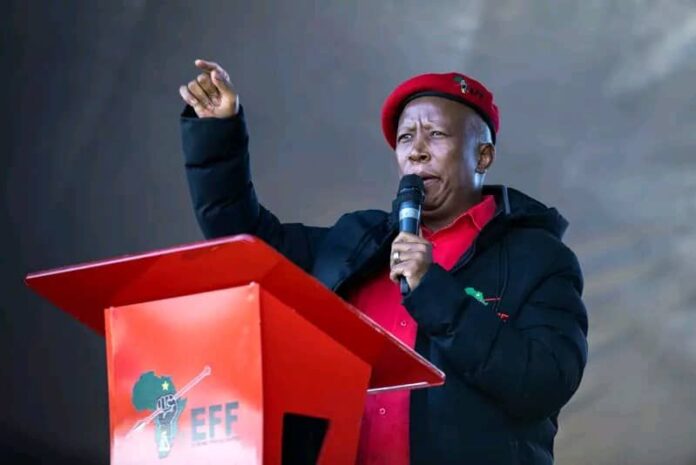By Burnett Munthali
South African opposition politician Julius Malema has been found guilty on five counts in a high-profile case concerning the discharge of a firearm.
The case stems from an incident during a 2018 anniversary celebration of his party, the Economic Freedom Fighters (EFF), where Malema allegedly fired a weapon.
Although the court has reached a verdict, Julius Malema has not yet been sentenced.
Legal experts note that he faces a potential prison term ranging from a minimum of two years to a maximum of 15 years, depending on the judge’s final ruling.
The conviction marks a significant moment in South African politics, as Malema is a prominent and polarizing figure who has built his influence through fiery rhetoric and populist policies.
Observers suggest that the outcome could have ramifications for his political career and the future activities of the EFF, especially as the party positions itself ahead of upcoming elections.

Supporters of Malema have already expressed concern over the ruling, claiming it may be politically motivated, while critics argue that it demonstrates accountability for unlawful actions, even by high-profile leaders.
Legal analysts anticipate that Malema’s defense team may appeal the decision, potentially prolonging the judicial process and keeping the case in the public eye.
The verdict also underscores South Africa’s broader challenges with firearm regulation and political conduct, particularly during mass rallies and party celebrations.
Across Africa, several political leaders have faced legal battles that tested their parties and movements.
In Zimbabwe, the late Morgan Tsvangirai, leader of the Movement for Democratic Change, was repeatedly arrested, detained, and harassed under Robert Mugabe’s regime, yet his legal struggles galvanized support and strengthened his party’s credibility among the electorate.
In Zambia, opposition leader Hakainde Hichilema was arrested multiple times under the Edgar Lungu administration on charges widely perceived as politically motivated, yet these challenges allowed him to frame himself as a resilient champion of democracy, eventually helping him secure the presidency in 2021.
Kenya offers another example: Raila Odinga faced repeated arrests, detentions, and political restrictions under various administrations, but his persistence enabled him to maintain a strong support base and influence national politics for decades.
These cases illustrate a common pattern in African politics: legal challenges against opposition leaders often strengthen their political narratives rather than weaken them, turning trials into opportunities to mobilize supporters and gain international attention.
For Julius Malema, the firearm conviction could similarly become a defining moment, positioning him as a defiant figure who continues to challenge the status quo despite legal hurdles.
As South Africa awaits his sentencing, both the EFF and the broader political landscape will be watching closely to gauge how this verdict shapes public perception, party cohesion, and the dynamics of the opposition ahead of upcoming elections.
The Malema case also serves as a cautionary tale for governments that attempt to use the legal system to weaken political opponents.
History across Africa shows that prosecuting opposition figures often backfires, transforming legal battles into platforms for mobilization, international sympathy, and political legitimacy.
By targeting prominent leaders like Malema, authorities risk reinforcing the narrative that the state governs through coercion rather than consent, which can energize supporters and attract global attention.
If mishandled, prosecutions can elevate the very figures governments aim to sideline, turning them into symbols of resistance and resilience.
For South Africa, the judicial process surrounding Malema will not only determine his personal fate but could also reshape political dynamics, highlighting the delicate balance between enforcing the law and preserving democratic credibility.
In the end, Malema’s conviction is a reminder that governments who overreach in targeting opposition leaders may achieve short-term control but inadvertently strengthen the long-term influence of the opposition.



